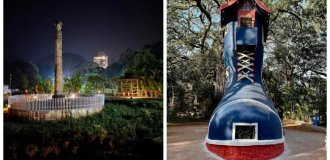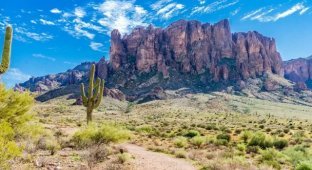Oil pirates of Nigeria (10 photos)
The African country Nigeria can rightfully be called the continent's record holder. First in Africa and sixth in the world in terms of population. It is a leader in terms of GDP. The city of Lagos is the mainland's largest metropolis. And, of course, oil is Nigeria’s main wealth, its “gold mine” and at the same time the contents of the syringe on which this country has been firmly “sitting” for a long time. 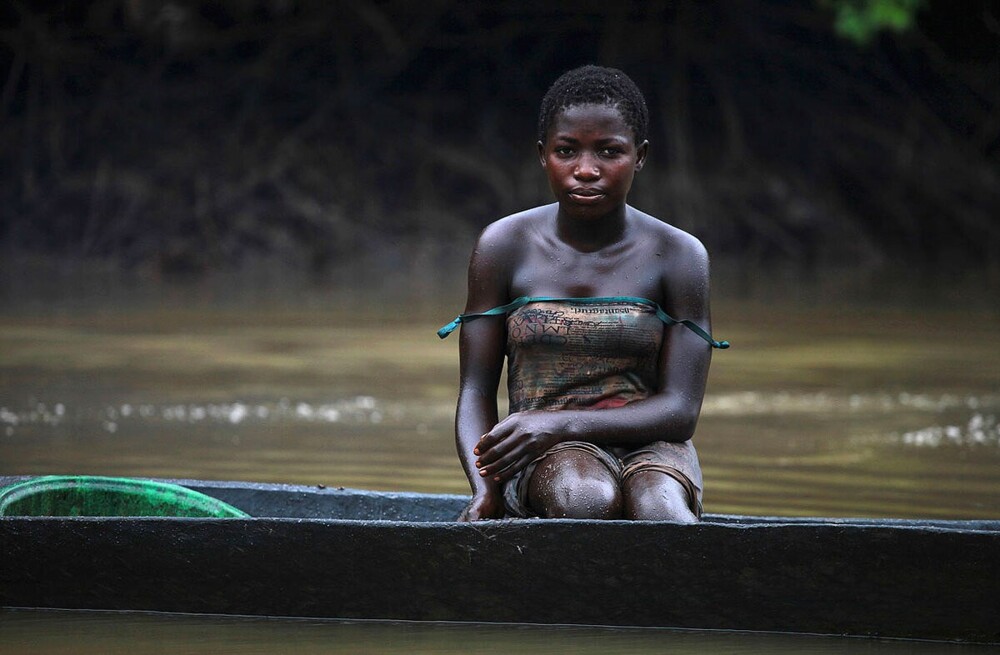
Oil for Nigeria is a real drug that, paradoxically, both enriches and kills the country. After all, in terms of living standards and the well-being of its residents, Nigeria is one of the poorest countries in Africa. More than 70% of its population lives below the poverty line. Well, if the people do not have the means and opportunities to earn a living, they begin to rebel. Or rob the state, turning into pirates. In the case of Nigeria - oil pirates. 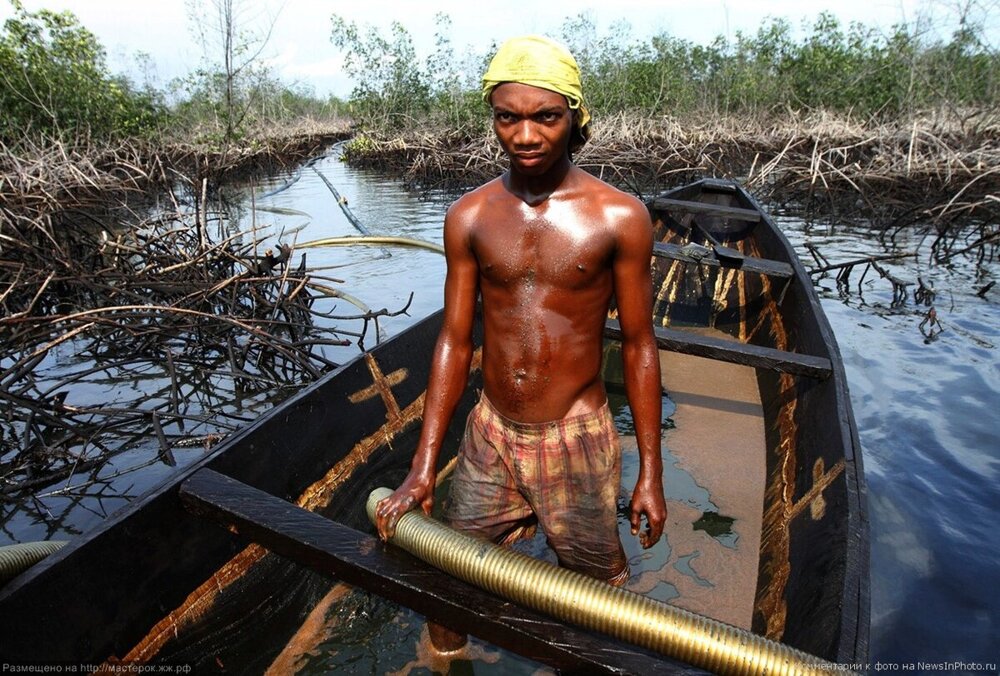
Nigerian oil pirate prepares to pump oil
Nature and oil
Located in western Africa, Nigeria is the owner of a unique ecosystem - the Niger Delta, which is located on an area of 70,000 square kilometers. The mangrove islands here are interspersed with countless channels and branches fanning out across the flat terrain. Swamps, tropical thickets, heavy humid air. Animals - crocodiles, hippos, small monkeys. Birds - geese, herons, eagles of prey. And above all this there is a huge yellow sun at the zenith.
But as it sets below the horizon, the dark Nigerian sky over the river delta begins to flicker from the lights of numerous oil rigs. The mouth of the Niger is the continent's largest oil-bearing area, the country's "golden plot" and its huge headache. For this territory has long been living by its own pirate laws. Free corsairs of Nigeria do not rob ships and caravans; they have other goals. The official ones are the liberation of the Niger Delta from foreign companies and the nationalization of all oil fields. Unofficial - ordinary robbery, kidnapping, oil theft and illegal extraction. 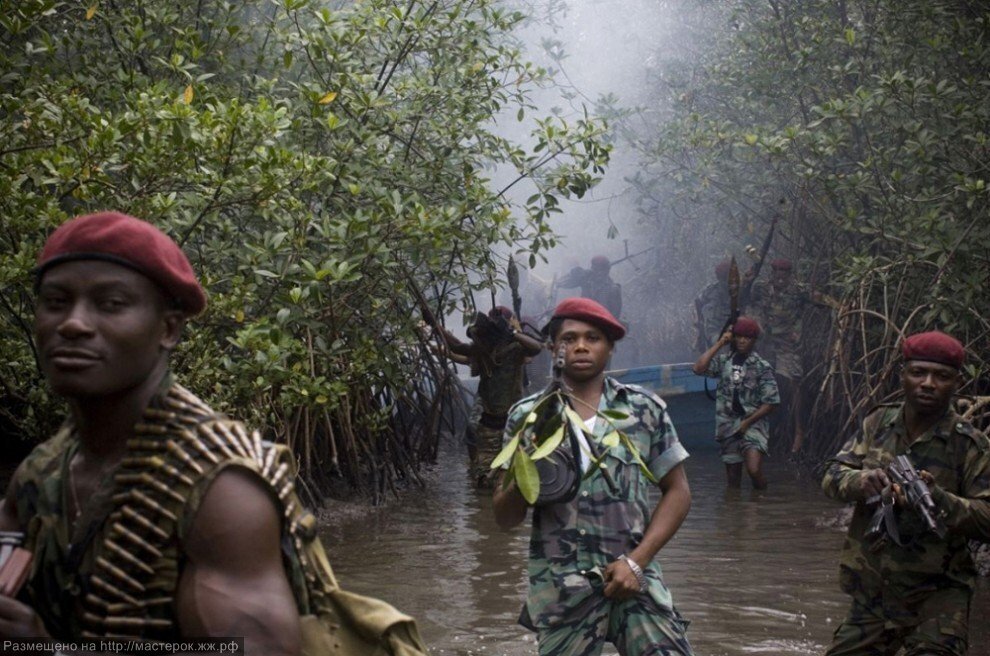
Nigerian oil pirates raid
At the end of the last century, Nigeria privatized its oil fields. Transnational corporations came to the country - Shell, Mobil, Elf, which began to invest huge amounts of money in production. However, all the taxes and contributions that they poured into the country's economy ended up in the pockets of a very small elite stratum. The majority of the population were and still are poor. Next to them, “black gold” flowed through the pipes. It flowed and flowed out of the country. The plan of action was obvious - stop wasting national wealth.
Undeclared war
No sooner said than done. In the Niger Delta, starting in 2006, a movement to free the river took shape. Behind such a seemingly innocent name was hidden the real hostilities that the rebels launched against oil companies. They kidnapped their employees and demanded huge ransoms for them. They attacked oil wells and set them on fire. Oil pipelines were blown up and tankers carrying raw materials were even attacked. Gradually, the most oil-bearing region of the country turned into the most crime-prone one. The example of the pirates was followed by ordinary people living in mangrove swamps. Illegal tappings into oil pipelines have become so frequent that oil has simply stopped arriving at its final destination at refineries and port terminals. All of it poured out in trickles, streams and fountains into barrels, buckets and even jars that were used by the local population. They sold the crude oil they stole in this way to intermediaries at a price of no more than $3 per barrel. And further along the chain, the “black gold” went to shadow tycoons, who sold it to those countries that turned a blind eye to the origin of the raw materials. 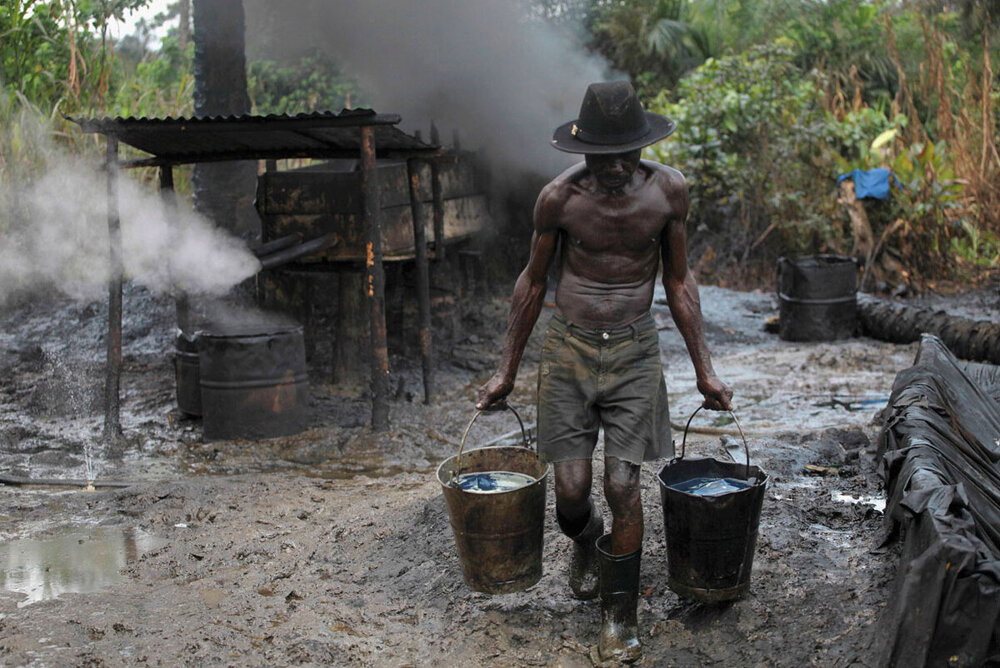
A Nigerian man scoops oil from the ground with buckets.
So what about the company? At first, they declared war on the pirates, enlisting the support of the Nigerian government and its army. But the scale of the theft turned out to be so great that all the oil pipes had to be surrounded by a dense chain of armed people. Shell and Mobil did everything they could to protect their fields - they surrounded the wells with a ring of fortifications, patrolled pipelines with helicopters, and erected fences. They even invested heavily in humanitarian projects to improve the lives of those Nigerians who lived in the delta so that they would stop stealing. In vain. Helicopters fell, blown up by shots from MANPADS, fences were demolished, oil wellsWe were blown up, and humanitarian aid ended up in the capital without reaching the place. 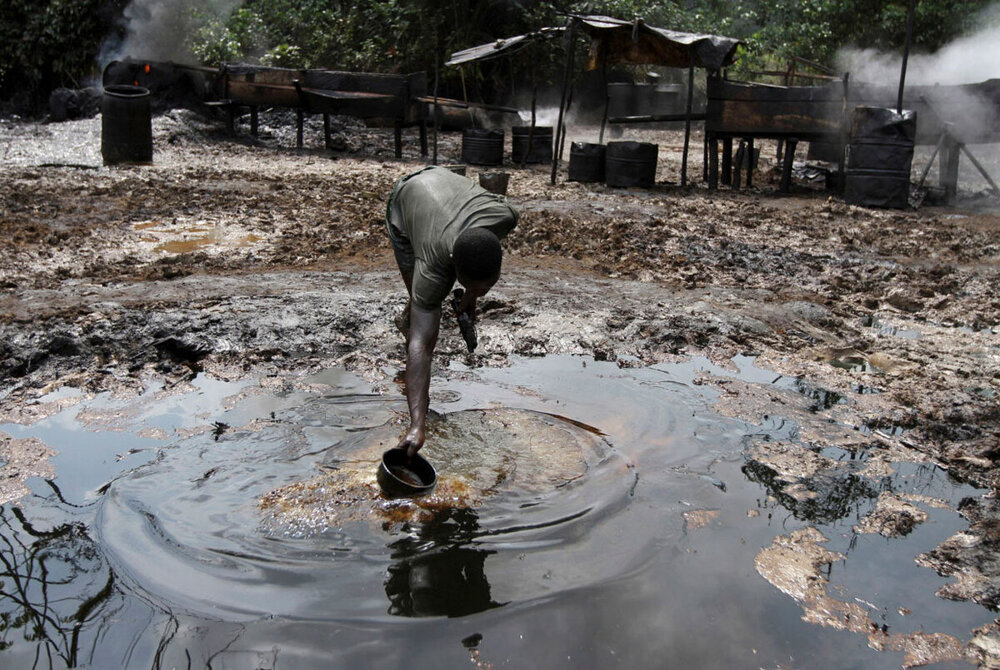
Illegal oil fishing in Nigeria
There was little hope for the army - often the commanders acted in concert with the pirates. And numerous military coups in the country have completely put an end to the protection of fisheries. The war for oil was lost. Realizing this, Western companies began to curtail their business. No, they did not leave completely, but they significantly reduced production, focusing on those deposits that could be protected without harm to themselves. 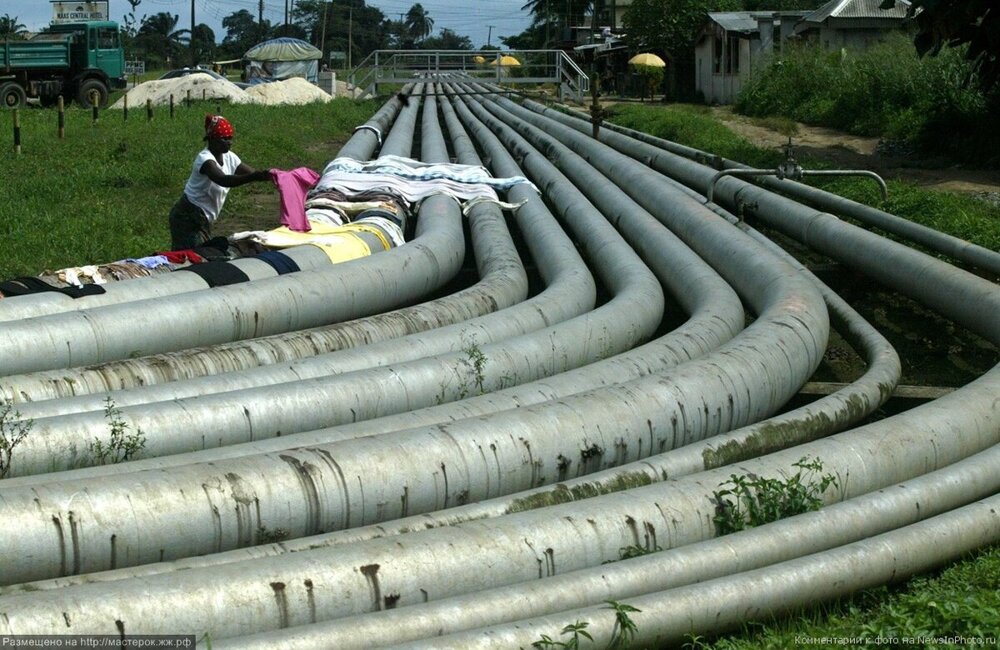
Nigerian oil pipelines are difficult to secure
Black hell in a black country
And abandoned wells fell into the hands of oil pirates. And now there is pure chaos going on there. Oil is pumped using the most primitive methods. Someone sells it, for lack of containers, simply pouring it to the brim into boats. Someone handcrafts gasoline into terrible quality and sells it on the illegal market. Surprisingly, the largest oil exporter, Nigeria is experiencing a fuel shortage and is forced to import petroleum products into the country.
Due to the lack of technology, oil often burns, spills across the delta, and mixes with mud, turning the surrounding nature into some kind of apocalyptic landscape. Blackness, fires, smoke - this is the typical view of the Niger Delta. What kind of hippopotamuses and herons are there? All living things simply ran away from these places, and the vegetation died under a greasy oil film. In general, mangroves have an exceptional ability to exist and develop in a saline environment and on soils deprived of oxygen. But oil spills defeated even them. Now there are no mangrove islands in the Niger Delta, there is only black, gnarled dead wood. And so it is everywhere. 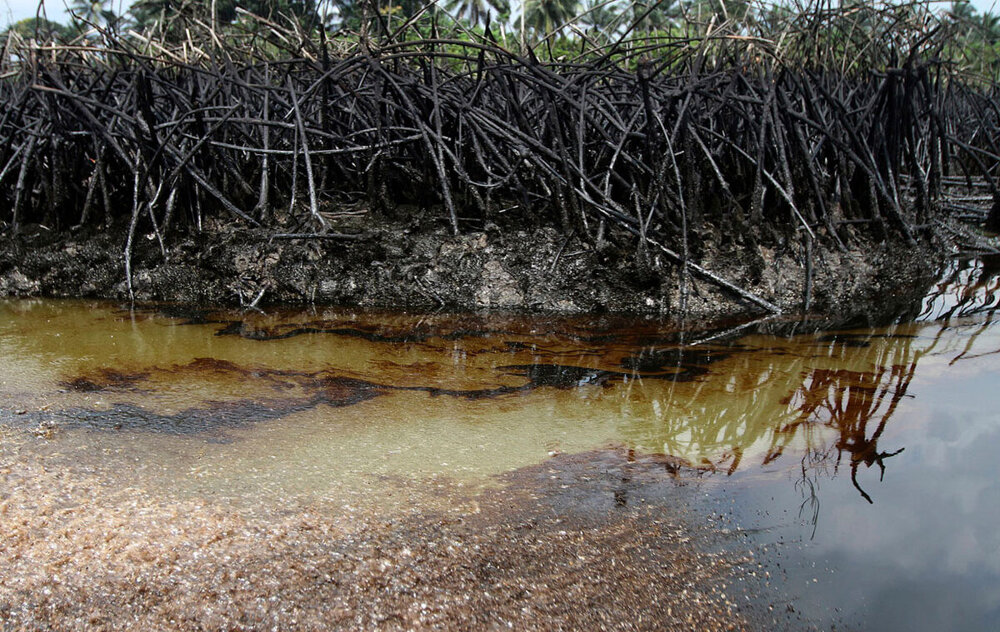
Dead vegetation in the Niger Delta
Today, Nigeria, according to conservative estimates, is losing about a quarter of its oil production. All of it is sold in rusty, dented barrels and chunky canisters to shady oil dealers. Not to say that they gave up on the theft - real military operations using aviation periodically take place in the Niger Delta. But their goal is the well-fortified bases of oil pirates. And the army doesn’t care about ordinary residents scooping up “black gold” with tin cans. And they are glad that their “business” does not bother anyone and continue artisanal mining. 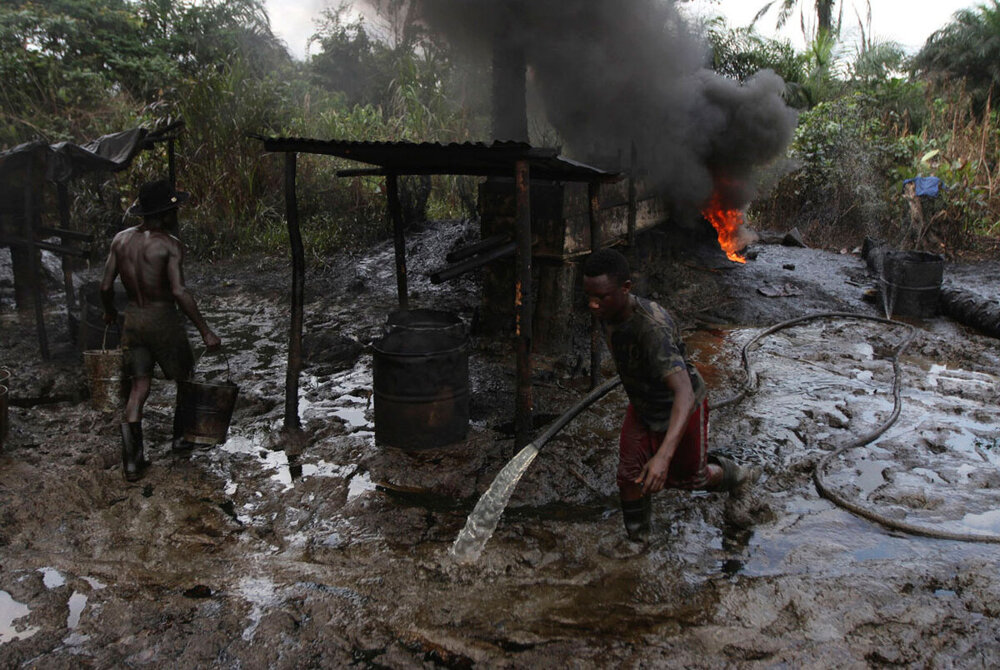
Illegal oil production plant
Despite all its apparent simplicity, this is an extremely dangerous matter. One careless action and a match or lighter can ignite the associated gas coming out of the wells. It gives off heavy black-fiery flashes from the oil itself. And now the whole region is on fire - the forest, the river, and even the ground, soaked through with an oily liquid, are burning. Nobody puts out such fires - they go out on their own. And then the authorities discover charred bones in the ashes. They indifferently record the incident and quickly depart on boats from this threshold of hell on earth. 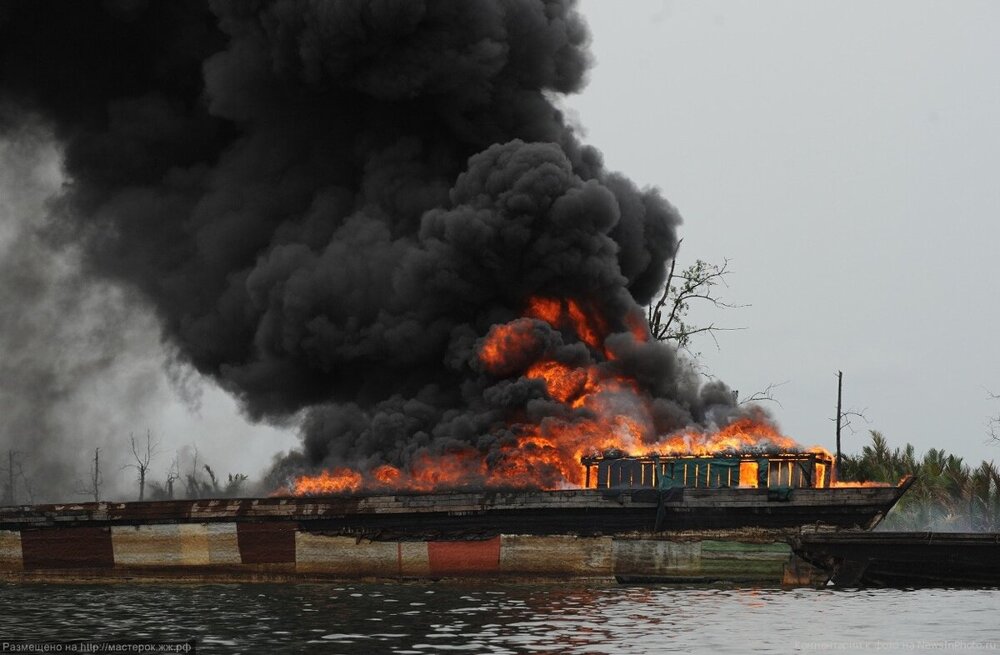
Fires in the Niger Delta are far from uncommon.
If only you want...
Well, what about oil pirates? They live and thrive by adapting to new conditions. Not long ago, the whole world was discussing the brazen antics of Somali pirates who captured huge ships in the western Indian Ocean. They demanded fabulous sums as ransom, and received them. And then all the villains suddenly disappeared somewhere. There are no more pirates. Moreover, physically, they were simply destroyed by one private military campaign hired by a wealthy Arab sheikh, who suffered heavy losses from the actions of sea robbers. 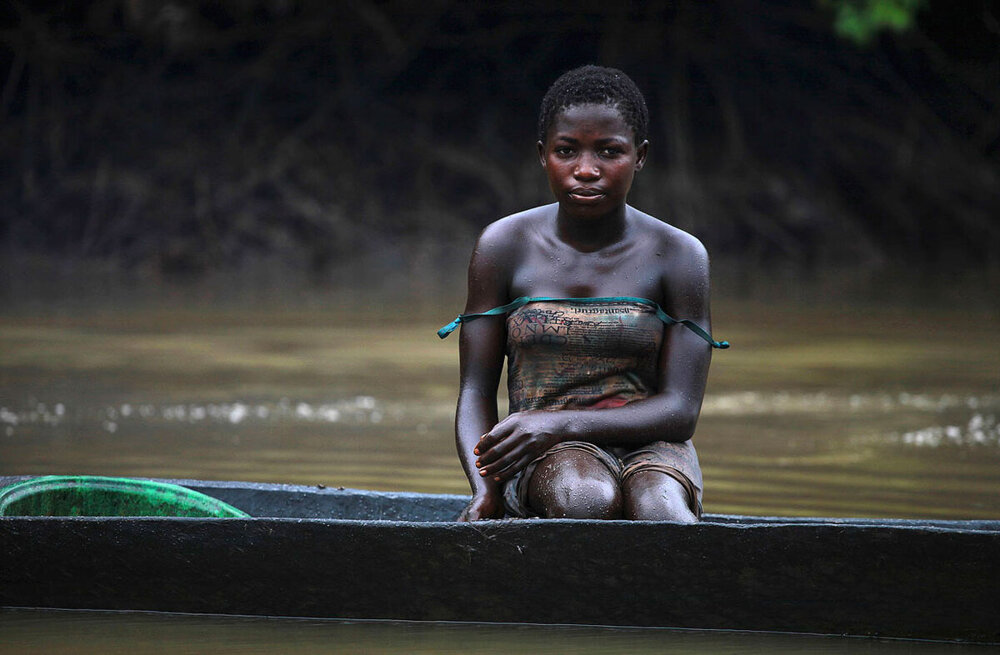
Women are also involved in illegal fishing
It’s a pity that Nigeria won’t have its own rich oil sheikh who can put an end to the anarchy in the Niger Delta. Maybe someday there will be a will, and with it a firm hand that will stop the unrest and lawlessness. Well, until this happens, the oil robbers will continue to wage war, destroying rather than saving the river delta.

